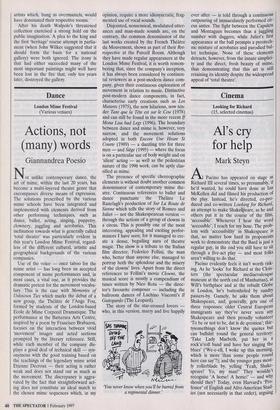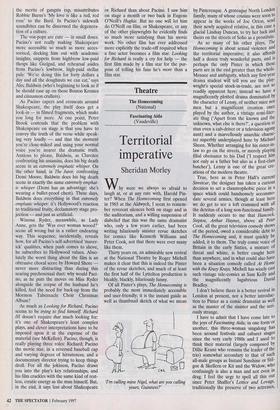Cinema
Looking for Richard (15, selected cinemas)
Al's cry for help
Mark Steyn
APacino has appeared on stage as Richard III several times, so presumably, if he'd wanted, he could have done as Ian McKellen did and filmed his production of the play. Instead, he's directed, co-pro- duced and co-written Looking for Richard, an attempt to make Shakekeare, as he and others put it in the course of the film, `accessible'. Whenever I hear the word `accessible', I reach for my hose. The prob- lem with 'accessibility' in Shakespeare is that, no matter how hard its proponents work to demonstrate that the Bard is just a regular guy, in the end you still have to sit through a five-act play — and most folks aren't willing to do that.
Pacino evidently feels it isn't worth risk- ing. As he 'looks' for Richard at the Clois- ters (the spectacular mediaevalesque museum at the north end of Manhattan), at Will's birthplace and at the rebuilt Globe in London, he's buttonholed by sundry passers-by. Gamely, he asks them about Shakespeare, and, generally, gets one of three responses: older Central European immigrants say they've never seen any Shakespeare and then proudly volunteer `To be or not to be, dat is de qvestion'; thir- tysomethings don't know the quotes but can bullshit round the general territory: `Take Lady Macbeth, put her in a rock'n'roll band and have her singing the blues' (`We-e-ell, I woke up this morning, which is more than some people round here can say'?); and the younger guys most- ly rollerblade by, yelling 'Yeah, Shake- speare! Yo, my man!' They wouldn't recognise 'A horse! A horse!' — and why should they? Today, even Harvard's 'Pro- fessor' of English and Afro-American Stud- ies (not necessarily in that order), arguing the merits of gangsta rap, misattributes Robbie Bums's 'My love is like a red, red rose' to the Bard. In Pacino's sidewalk soundbites can be discerned the degenera- tion of a culture.
The vox-pops are cute — in small doses. Pacino's not really making Shakespeare more accessible so much as more acces- sorised, decking him out with academic insights, snippets from highbrow low-paid thesps like Gielgud, and rehearsal asides from Pacino's lowbrow, high-paid stellar pals: 'We're doing this for forty dollars a day and all the doughnuts we can eat,' says Alec Baldwin (who's beginning to look as if he should ease up on those Boston !Cremes and cinnamon crullers).
As Pacino capers and crosscuts around Shakespeare, the play itself does get a look-in — in filmed fragments, which make you Tong for more. At one point, Peter Brook contends that the problem with Shakespeare on stage is that you have to convey the truth of the verse while speak- ing very loudly — and that the moment you're close-miked and using your normal voice you're nearer the dramatic truth. Anxious to please, Baldwin, as Clarence confronting his assassins, does his big death scene in an extremely emphatic whisper. On the other hand, in The Juror, confronting Demi Moore, Baldwin does his big death scene in exactly the same extremely emphat- ic whisper (Demi has an advantage: she's wearing a bullet-proof chest). These days, Baldwin does everything in that extremely emphatic whisper:• it's Hollywood's reaction to traditional fruity, declamatory stage pro- jection — and just as artificial.
Winona Ryder, meanwhile, as Lady Anne, gets the Was ever woman wooed?' scene all wrong but in a rather endearing way. This sequence, incidentally, reveals how, for all Pacino's self-advertised 'maver- ick' qualities, when push comes to shove, he subscribes to Hollywood values. Abso- lutely the worst thing about the film is an obtrusive choral score by Howard Shore never more distracting than during this searing psychosexual duet: why would Paci- no, as he puts the moves on Miss Ryder alongside the corpse of the husband he's killed, feel the need for back-up from the Mormon Tabernacle Choir Christmas Album?
As much as Looking for Richard, Pacino seems to be trying to find himself Richard III doesn't require that much looking for: it's one of Shakespeare's least complex plays, and clever interpretations have to be imposed upon it at the expense of the material (see McKellen). Pacino, though, is really playing three roles: Richard; Pacino the movie star, in a reversed baseball cap and varying degrees of hirsuteness; and a documentary director trying to keep things droll. For all the jokiness, Pacino draws you into the play's key relationships, and his film crackles with the same kind of rest- less, erratic energy as the man himself. But, in the end, it says less about Shakespeare or Richard than about Pacino. I saw him on stage a month or two back in Eugene O'Neill's Hughie. But no one will let him do O'Neill on film, or Shakespeare, or any of the other playwrights he evidently finds so much more satisfying than his movie work. No other film has ever addressed more explicitly the trade-off required when a fine actor becomes a film star. Looking for Richard is really a cry for help — the first film made by a film star for the pur- pose of telling his fans he's more than a film star.



























































 Previous page
Previous page